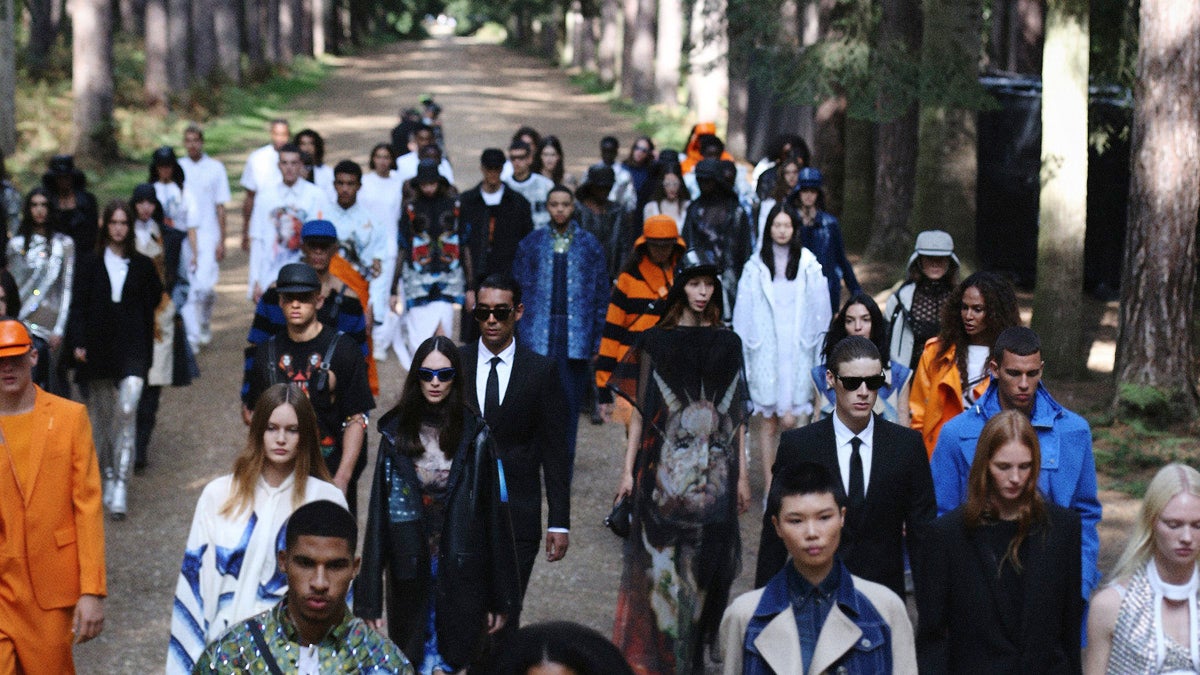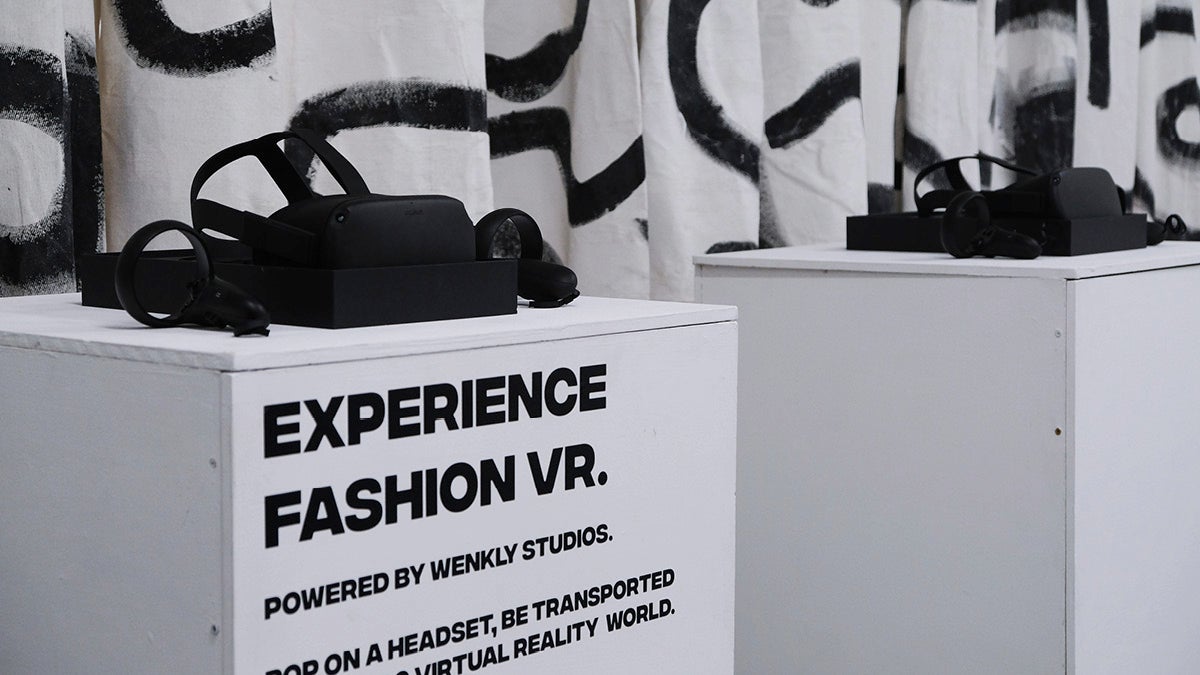
Often the most innovative moments come from chaos. So says Rebecca Morter, founder and chief executive of retail marketplace and community Lone Design Club. And it doesn’t get much more chaotic than a pandemic. Coronavirus restrictions meant brands and designers had no choice but to do things differently for London Fashion Week. The result? The event, often criticised for being outdated, was revitalised with renewed purpose, creativity and accessibility.
Does a livestreamed London Fashion Week work?
Whereas catwalk shows are usually the main event, this time around the front row was almost entirely replaced by the armchair as brands either live streamed their remote catwalk shows or released conceptual films to showcase their collections.
“I’m all for the creative videos,” says Georgie Hyatt, co-founder and chief executive of Rotaro fashion rental service, who attended London Fashion Week both virtually and in person. “I think they engulf you in the world of that brand even more so, and what I really liked was the innovation and creativity I saw from brands that were challenged to think outside the confines of the traditional fashion show.”
While film was a welcome focus for some, others found it couldn’t compete with the theatre of a live London Fashion Week show. Fashion student and blogger Ruth MacGilp watched Burberry’s livestream, which kicked off proceedings, via Twitch. The digital show was available for all to watch, sidestepping the usual exclusivity of such high-fashion shows, but she found it was “hard to get lost in the mood of the collection”.
Burberry’s 23-minute virtual catwalk was filmed at an undisclosed, sun-lit forest near London. Created in collaboration with artist Anne Imhof, models rambled among the woodland wearing the latest In Bloom collection in a dramatic, dream-like performance as artist-musician Eliza Douglas performed live.
“I felt an increased sense of separation, like the contrast of the luxury clothes and models versus my very unglamorous lockdown reality just widened the void,” says MacGilp.
What both MacGlip and Hyatt can agree on, however, is that a virtual show is necessary in putting a stop to people flying around the world for the sake of a ten-minute show. MacGlip says: “There’s no way we can return to that kind of frivolous pollution.”
The contrast of the luxury clothes and models versus my very unglamorous lockdown reality just widened the void
The designers behind sustainable brand 1x1 Studio, who chose to film their spring-summer 2021 catwalk, know that capturing the essence of a live show on film isn’t easy. But they’re eager to press ahead with the format. “Traditional shows bring the real temperature to the audience,” they say, “and we are still looking for ways to make audiences feel as touched as they do by a physical show. It’s challenging, but we’d love to try.”
Embracing socially-distanced catwalk shows
As the usual pack of editors, influencers and attendant street-style photographers stayed home rather than jumping on planes and hopping between sponsored chauffeured cars, the carbon footprint associated with London Fashion Week shrunk dramatically. So too did the crowds and the few who did attend the reduced number of COVID-19-safe shows found it was an altogether calmer affair.
For Hyatt it was a change for the better. “There was no queueing up for hours to get into a show,” she says of the Bora Aksu catwalk she attended. “There wasn’t any jostling. We just arrived, walked in and sat at our bench. I preferred that.”
Those who didn’t get an exclusive show invite were offered a select number of other physical events. Luxury brand L Saha had planned to host a catwalk show as usual this season, but in response to restrictions, models were swapped for a mannequin and creative director Laboni Saha settled into an event space in Somerset House, allowing visitors, as well as viewers tuning in via Instagram Live, to watch as she deftly crafted a dress from scratch over a nine-day period.
“I thought if we’re not going to do a show, we can at least share something that we’ve never shared before and show the transition of taking a bundle of yarn and turning it into a finished dress. I love the thrill of the show and the kind of content we get from it,” says Saha, acknowledging that catwalks will continue to be part of their future once restrictions are lifted.
But the experience this London Fashion Week provided has been a catalyst for experimenting with other formats too. “We definitely want to carry on in new, different and more innovative ways,” she says.
Blending physical with digital
While L Saha used technology as a way to broadcast their physical event, for Lone Design Club (LDC), it was central to the experience itself. Visitors to their pop-up London Fashion Week event were treated to a series of virtual and augmented reality experiences, including an activation created by Wenkly Studio which allowed visitors, both in person and remotely, to explore and interact with a virtual LDC store.
“It was about asking ‘how can we really start to merge the physical and digital even more to keep that idea of a global community alive?’” says Morter of the newly globalised fashion week format.

By combining the physical with the digital, she aims to “approach fashion week on a totally different scale”, a sentiment echoed by many brands and attendees as they’ve had a taste of a more sustainable, innovative future for London Fashion Week. For some, the catwalk will always be the ultimate manifestation of fashion, but it’s clear London Fashion Week, under COVID-19, represents an opportunity for change that many are eager to embrace. “It’s about time fashion had a kick in the pants,” Morter concludes.

Often the most innovative moments come from chaos. So says Rebecca Morter, founder and chief executive of retail marketplace and community Lone Design Club. And it doesn’t get much more chaotic than a pandemic. Coronavirus restrictions meant brands and designers had no choice but to do things differently for London Fashion Week. The result? The event, often criticised for being outdated, was revitalised with renewed purpose, creativity and accessibility.
